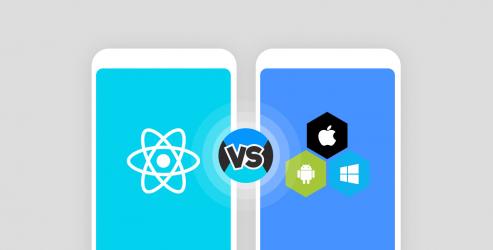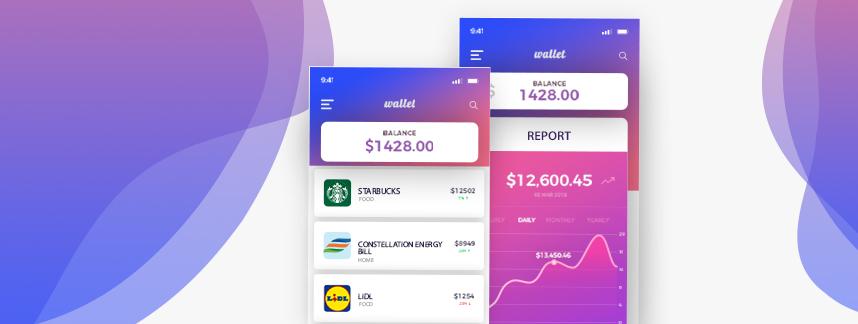
Smartphones are universally integral devices, unlike other digital devices and this can be justified with the fact that over 50% of the internet users thrive on it (Cannot agree less) - as everything can be found on them.
And of course, the great availability of cost-effective and customized mobile application options has increased the demand for smartphone.
Transforming Market Trend:
Smartphone dependence can be attributed to the comfort of functionality and convenience. In the early 2000s, numerous companies started working on their respective desktop websites. And the first half of the 2010s remarks an alarming shift from desktop websites to mobile apps. Here, we can see how gradual transformation accompanied the entire interface with more personalized and precise form.
Well, this has built confusion among the developers, which one to choose - the native or Hybrid Apps Development.
Native Application:
Any application built specifically for a specific smartphone operating system is referred to as a native application.
For smartphone applications, the development is executed leveraging Objective-C or Swift for iOS and Java for Android. Further, depending upon the user base of iOS and Android across the world, most enterprises prefer having applications on these platforms alone. Native Mobile App Development plays an important role in enhancing and personalizing the user experience. They are developed based on the device?s operating system, using technical, and UI/UX principles, to execute the entire process in a more interactive, intimate, and engaging manner for the user.
For instance; if your app has the swipe gesture or any other relevant gesture, they will be in sync with the device. This is aimed at offering a unified experience.
The advantages of opting for a native mobile app include support of performance, precision, and perfection. There is no concern about any bugs or lags that might arise due to an unexpected incompatibility with the operating system. Also, it guarantees compatibility as the functioning of the application (sync with the other primary applications hosted by the OS).
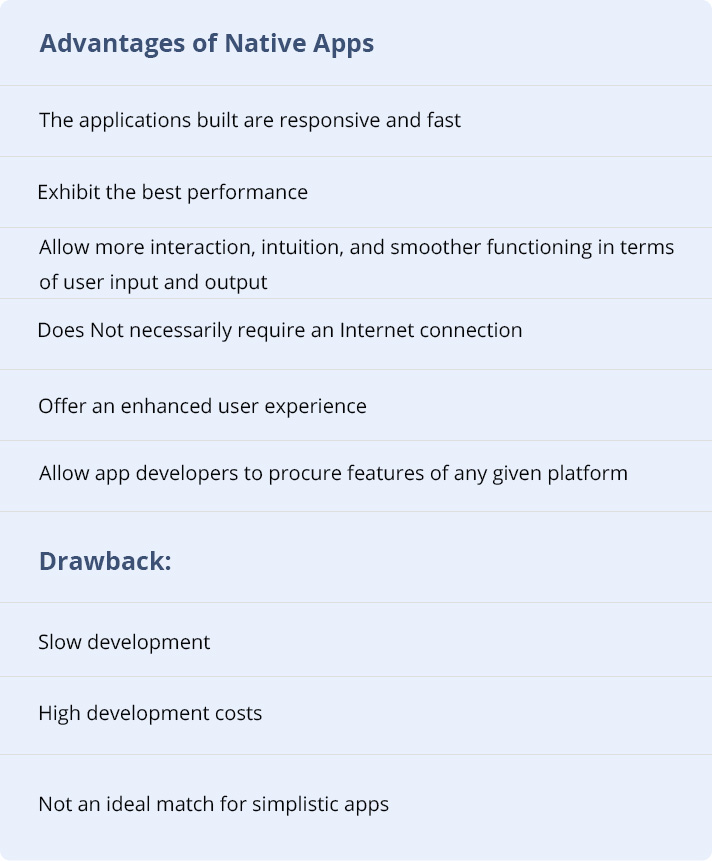
Hybrid Applications:
Hybrid Application - Any application development process with an intent to serve varied operating systems leads to the development of a hybrid app framework. The applications are built using HTML5 or JavaScript and ?sugar-coated? to obtain a native mobile app like feel and run.
Basically, they operate and function similar to the native mobile app, but the similarity is limited to the framework of the application - as these incorporate the basic controls, navigational components, and other structural features.
Having a hybrid app framework comes as great benefits for business groups, enterprises, and startups looking to hit a greater number of people in a limited time frame.
Native apps require time for development, whereas hybrids can be hosted promptly and with ease. The plug-ins involved the hardware security and OS adaptabilities do not limit the functioning of the app. When it's about hybrid app development, PhoneGap/Cordova and Appcelerator Titanium are the most preferred tools. These allow the developer to design HTML/CSS/JavaScript local files.
Other major benefits of opting for hybrid mobile app development - the enterprise have access for multiple platforms based on single code also.
The hybrid applications developed does not take extensive development time, and once the app is developed - it will run on multiple platforms.
Must Read: Native or Hybrid App Development: Finding a Better Bet
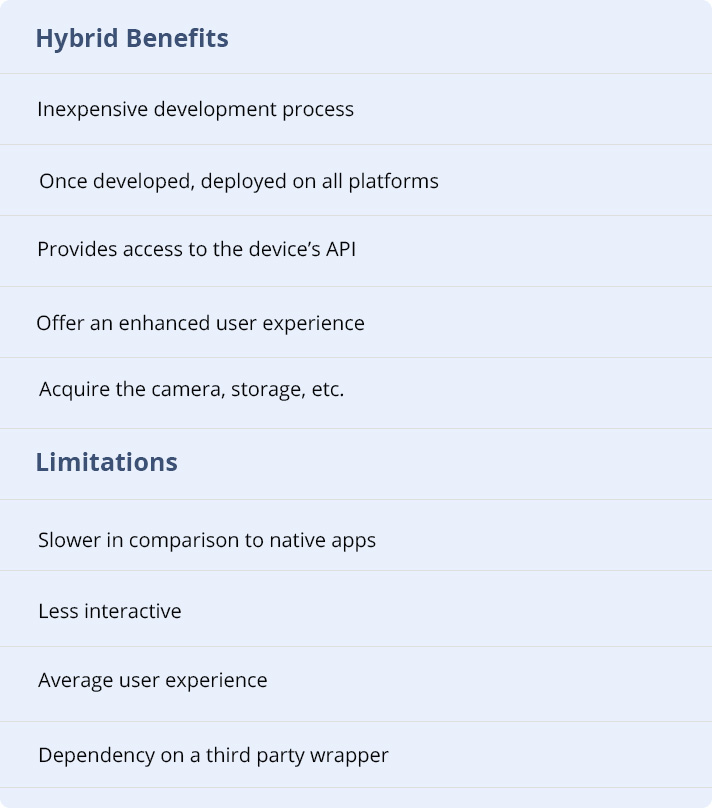
Let's discuss the difference between Native app or hybrid app development?
The foremost difference between the native app and hybrid app development begins with the development process of the app. With the hybrid, everything is developed at once and can be used for multiple platforms (unlike opposite to doing it all separately).
Comparison:
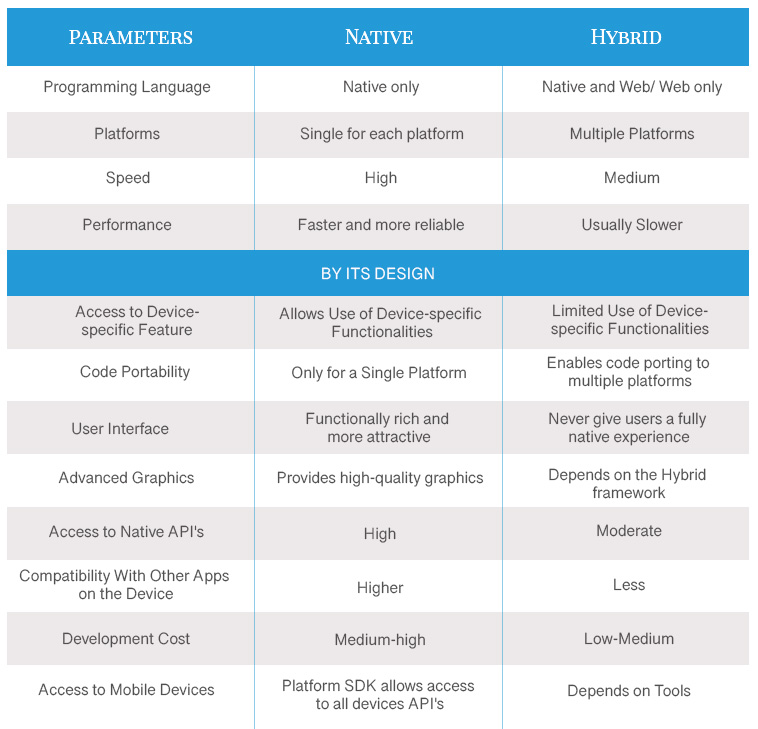
Conclusion:
As far the comparison is concerned, Native apps are known for excellent user experience and lead the foundation on speed and other technical aspects. Whereas Hybrid apps are an excellent option for simple apps and don?t necessitate extensive time and resources
Well, we understand everything holds some advantages and disadvantages, thus it?s a crucial task for the Mobile Application Development team to make the right decision depending upon the requirement of the business.
Thus, it's advised to consult a native or a hybrid app developer for complete consultation before proceeding for the business venture.






